Is SEO Dead in 2025?
AI IN SEO
Agnes A. Gaddis
4/18/202534 min read


SEO is not optional, but essential for success if you’re a real estate investor. For any investor looking to maximize returns, SEO is definitely a cost-effective way to attract people who are already looking for what you offer. According to HubSpot, inbound leads (including SEO) cost 61% less than outbound leads.
Ignoring SEO means you’re essentially throwing money away and missing out on valuable opportunities.
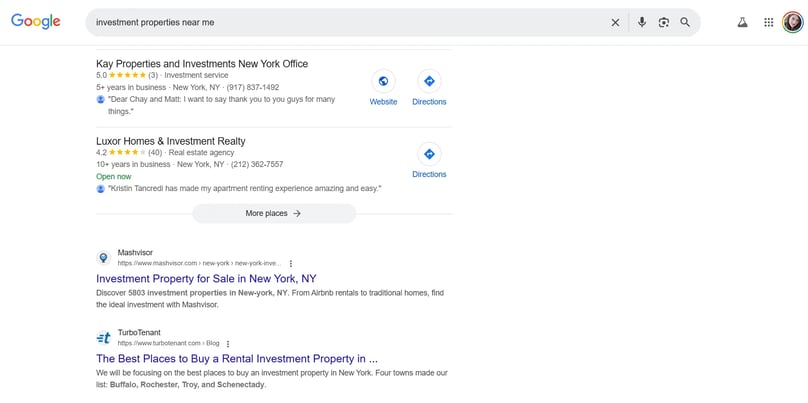

But many people are asking, is SEO dead in 2025? The truth about SEO is that it's evolving, not dying.
The rules of SEO are changing. AI and LLMs are the key drivers of this change. However, while traditional keyword-centric SEO methods are becoming less effective, SEO itself is far from dead. Instead, it's transforming into something new, and as a real estate investor, you need to understand these changes to stay ahead of the curve.
In this article, we’ll see the state of SEO in 2025, the latest SEO effectiveness statistics, and how AI impacts search. The insights shared here are based on research done by reputable sources like Statista, Semrush, First Page Sage, NP Digital, and SparkToro, along with my own first-hand experience doing SEO and content marketing work for real estate professionals.
Key Takeaways
1. SEO is not dead, it’s undergoing a major transformation: SEO is definitely still relevant in 2025. But due to the rise of AI and large language models (LLM), it is evolving. For many small to medium scale brands, the old keyword-centred tactics aren’t going to work as well as before.
Marketers need to adapt by shifting the focus entirely to user experience: creating content that genuinely helps their users, demonstrating expertise with their author bios and some degree of experience about the subject matter within their content (facts, stories, and experience statements), and providing a great user experience (fast loading sites).
2. AI features in search present both a challenge and an opportunity: Google’s AI Overviews has reduced organic clicks from SEO, but it has also created a new opportunity for any kind of brand (large or small) to gain brand awareness (as long as their content is good enough and matches user intent). To appear in these AI Overviews and other search snippet opportunities, you need to start creating schema markups for your blog posts, author pages and product pages.
3. Don’t put all your SEO eggs in the Google basket: Google still dominates search, with nearly 90% market share as of January 2025. But you need to recognize that it’s losing its grip, especially with younger folks. 46% of Gen Z users now prefer social media for search. There are a lot of ways people now find information - AI tools, social media, and even forums like Reddit and Quora.
The takeaway is that your SEO strategy must evolve beyond traditional Google-centric strategies. You need to broaden your horizon and be visible on other platforms too, especially on social media and AI search tools.
4. Double down on user intent, user experience, and building brand authority: In 2025, you can’t ignore the foundational technical aspects of SEO (mobile optimization, Core Web Vitals) or the importance of building authority signals (backlinks, social presence, brand recognition).
But what you really want to double down on is genuinely understanding what your ideal customer searches for and making sure your content and site delivers in the best possible way. SEO is now more about obsessing over user needs than just keyword density.
5. AI tools streamline SEO processes: 86% of SEO professionals now use AI tools to automate tasks like keyword research, content optimization, technical audits, and link building. These tools can help you save a lot of time. However, you can’t just let AI do everything, especially when it comes to creating content.
AI requires human oversight. You need a human to review and edit each content piece to make sure it’s actually good (doesn’t sound automated), accurate, and can be clearly understood by your audience.
The Truth About SEO Today: Is it Still Relevant in 2025?
SEO is still important in 2025, but now it’s much more than simply stuffing keywords into content. You need to create content that genuinely helps users and provides a great experience.
Google’s AI Overviews is changing the SEO game, and we, as content creators and SEO professionals, must adapt. We have to think less about gaming the system and more about creating content that's so good, so relevant, and so helpful that not just humans, but even AI recognizes its value.
As of now, AI overviews represent about 15% of SERP search results (so 85% of search queries do not get affected by AI Overviews). This results in an 18-64% decrease in organic clicks for affected queries. But there’s still an opportunity to build brand awareness through AI Overviews. That is, when your website or brand name gets included in AI-generated summaries.
In short, forward-thinking SEO professionals are not just focusing on traditional rankings in 2025, but are now using SEO to build overall brand awareness. This approach aligns with the broader future of search, where search engines are becoming more sophisticated and personalized.
Also, there’s a massive shift in how search engines value content. User-generated content (UGC) is becoming incredibly powerful in the world of SEO, with platforms like Reddit and Quora seeing massive growth in organic traffic (603.4% and 379.3% respectively between June 2023 and June 2024).
That’s because two of the major criteria Google now uses to judge the quality of content are expertise and experience. That is, the expertise of the person who created it (they have actual expertise on the topic). In some cases, they may just have actual real-life experience but may not be experts. The content would probably still meet the high-quality mark. That’s what we’re seeing with forum pages on Quora, BiggerPockets (real estate), and Reddit.
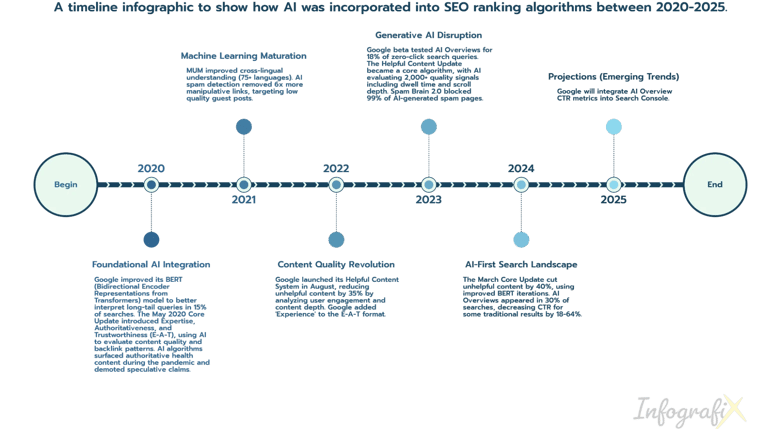

The truth about SEO today is that it's more than just ranking number one on Google. SEO is no longer just about Google. You, as a marketer, need to think more broadly.
Large Language Models (LLMs) like ChatGPT and Perplexity AI are challenging Google’s market dominance. Its market share dropped below 90% for the first time since March 2015 in October 2024. This means you should be optimizing content for multiple platforms, including social media platforms and AI search engines.
Will SEO Exist in the Next 5 Years?
As long as people are using search engines to find things, there will be a need for the process of making content discoverable. To me, this is the foundation of SEO. And this is why SEO will likely remain relevant for the next 5-10 years. So the answer to the common questions, “is SEO dead in 2025?” or “will SEO exist in the next 5 years” is no.
SEO isn't going anywhere anytime soon, but it is going to change – perhaps dramatically with advancements in AI. Right now, AI already plays a major role in how search engine optimization is performed. It’s not just Google’s AI Overviews that’s disrupting things. As of now, 86% of SEO professionals already use AI SEO tools to automate tasks and optimize for search engine ranking factors.
But even with all these changes, the fundamental principles of SEO remain the same: create fantastic content that users love and that satisfies their search needs, and help them find what they need with a seamless user experience. These core elements are timeless, even as the future of search unfolds.
The rise of AI and alternative search platforms is creating both challenges and opportunities for SEO. The challenge is that organic click-throughs have decreased for at least 15% of all searches (generic searches) as AI summaries take center stage.
But this also creates an opportunity for brand awareness and maybe even clicks, if your content is featured in these summaries. This shift is redefining the latest SEO strategies, pushing marketers to think beyond traditional metrics.
Your SEO content strategy shouldn’t just be about ranking in the top 5 SERP positions, but also showing up in AI Overviews.
The Impact of the Recent Google Algorithm Update on SEO for Real Estate Investors
Google is really doubling down on user satisfaction. Their August 2024 Core Update was all about making sure that when people search for information, including real estate information, they get content that’s genuinely helpful and informative, not just content that’s gamed the system to rank high.


The latest Google algorithm updates have raised the bar for content creators. What that means for you as a real estate investor is that your content has to offer real, actionable value for sellers and investors if you want it to rank high.
And as mentioned before, real estate websites should no longer just optimize for high rankings but also for inclusion in the SGE Carousel at the top right of AI Overviews search results. Being featured here offers a good opportunity to create brand awareness, and maybe even get clicks. This is one of the key SEO trends for 2025 that real estate marketers should keep an eye on.
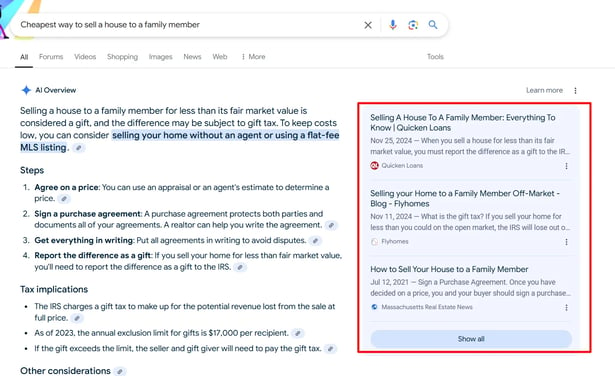

You have to make sure your content is good enough to be featured in AI Overviews, which means really understanding what people are searching for, and providing them with valuable answers with very little fluff.
How User Behavior is Changing Search
There’s a significant shift happening in how people search for information. While traditional search engines like Google aren’t going anywhere, social media is becoming a real contender for where people, including myself, go to find information online.
As of April 2024, just 34% of U.S. adults indicated a preference for using traditional search engines like Google to find information online. Around 66% (nearly half) of U.S. searchers now use either social media or search engines or both, depending on their specific needs. This trend is a clear indication of the evolving state of SEO.
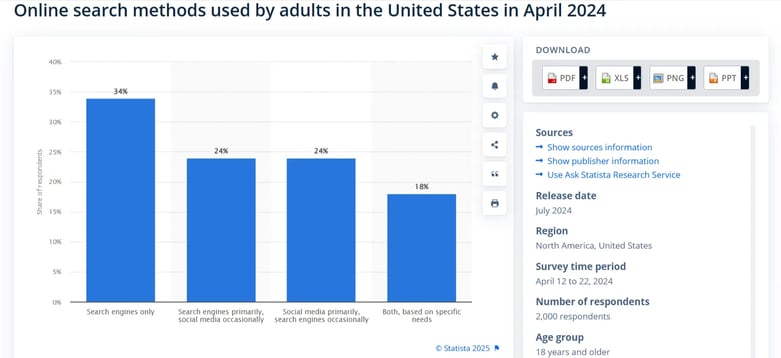

The general takeaway from this is that the way we search for things online is evolving. It's not just about typing a query into Google anymore.
If I'm looking for a quick answer or a specific product, I might still use Google. But if I want recommendations, reviews, or to see what's trending, I might turn to social media instead. In the future of search, users are likely going to be using diverse platforms for information.
And for the younger crowd, especially Gen Z, social media is becoming the go-to place for finding information. Around 46% of Gen Z internet users use social media to find information online. So to reach more people, especially the younger generation, apart from optimizing for traditional search engines, you need to be active and visible on social media platforms. This is going to be one of the most effective SEO strategies for 2025 and beyond.
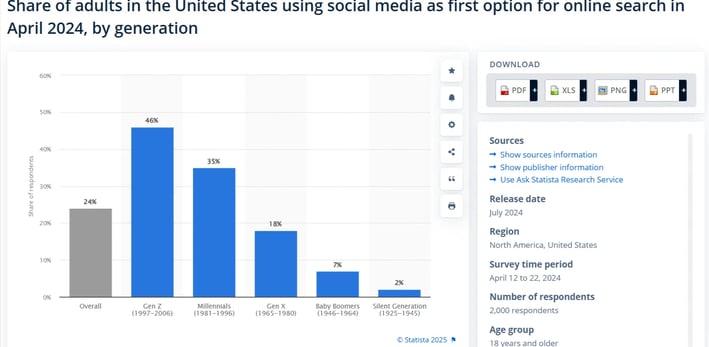

However, you still need to prioritize Google in your search engine optimization efforts, given its overwhelming dominance. For more than a decade, Google has been the leading search engine worldwide across all devices. As of January 2025, it holds 89.62% share of the global search engine market.
Google is still the undisputed king of search. And staying abreast of its algorithm updates and search engine ranking factors is crucial for SEO success.
The biggest threat to Google's dominance is AI. Even though artificial intelligence (AI) already plays a significant role in search, it’s expected to play a much larger role in the future. This is why many people ask the question, “Is SEO dead in 2025?” AI is poised to become a major way that people will find information online in the very near future.
This is why we are seeing the rapid growth of an SEO offshoot called Answer Engine Optimization. This is going to be much more important in the near future.
In 2023, approximately 13 million U.S. adults said AI was their primary tool for conducting online searches. Note that this doesn’t mean they didn’t use other search engines like Google also. But what’s staggering is the projection that this number might increase to over 90 million by 2027.
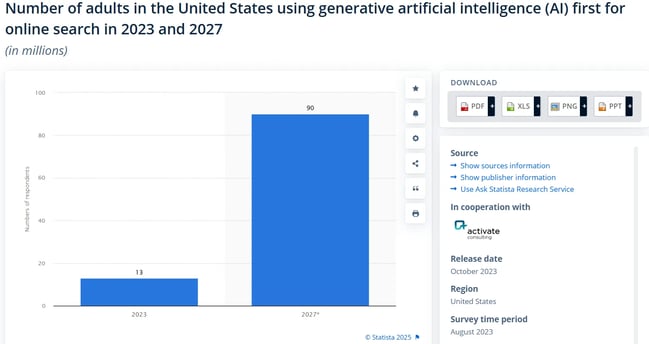

User Behavior Impact 1: Shift to Voice and Visual Searches
We are seeing a fundamental change in how people interact with search technologies. Search is more than just typing keywords into a search bar nowadays. The increased use of voice assistants and AI vision means that more people are shifting to voice and visual searches. We are talking to our devices, asking them questions, and even using images to find what we’re looking for.
So instead of typing "best Italian restaurant," a potential customer might ask their voice assistant, "Where's the best Italian restaurant near me open now?" Or, they might use Google Lens to take a picture of a product and find out where to buy it.
This shift means that if I'm creating online content or trying to optimize a website, I need to think about the long-tail, conversational phrases people might use in voice searches. And I need to make sure my images are optimized for visual search (i.e. using descriptive alt tags). These are some of the latest SEO strategies to consider in light of the changing search landscape.
User Behavior Impact 2: Increased Expectation of Immediate and Personalized Results
When I search for something online, I don't want to sift through pages of results anymore. I expect the search engine to understand what I'm looking for and give me the answer right away, tailored to my specific needs and preferences.
Instant gratification is becoming the norm in online search. Searchers are becoming more impatient and expect search engines to be smarter. They want quick, easy-to-digest answers, and they want those answers to be relevant to them personally. So you should focus on creating content that is not only easy to read but also provides useful, specific information quickly and is tailored to what users are looking for.
This is why keeping up with Google algorithm updates is crucial, as they often reflect these changes in user behavior.
User Behavior Impact 3: Greater Emphasis on User Engagement and Satisfaction Metrics
User behavior directly affects search rankings. It's not just about how many people visit your website; it's about what they do when they get there. If users click on my site but quickly leave, that sends a negative signal to Google, potentially hurting my rankings. This kind of antagonizes the idea of creating short, to-the-point content.
You want to be concise but answer people’s queries with depth. They should be able to get answers to as many questions as they have about a particular topic on your site. But your answers have to be concise, with very little fluff.
Google's algorithm updates have consistently emphasized the importance of user experience. Google pays attention to how long people stay on your site (time spent on a page), whether they click on your pages in the search results (click-through rates), and if they bounce back to the search results (bounce rates).
This means that if I'm responsible for a website's SEO, I need to focus on creating content that's not only optimized for keywords but also engaging and satisfying for the user. I need to make sure my website is easy to navigate, provides valuable, in-depth information, and encourages visitors to stay and explore.
SEO Effectiveness Statistics 2025
Despite all the changes in the digital landscape with AI and social media search and amidst questions like "Is SEO dead in 2025?", SEO remains a powerful tool for businesses. 91% of respondents to a survey by Conductor reported that SEO delivered real results for their businesses in 2024. It remains a major source of website traffic for many businesses.
Conductor’s study of website traffic data across seven key industries in 2024 showed that organic search contributed 33% of overall website traffic on average.
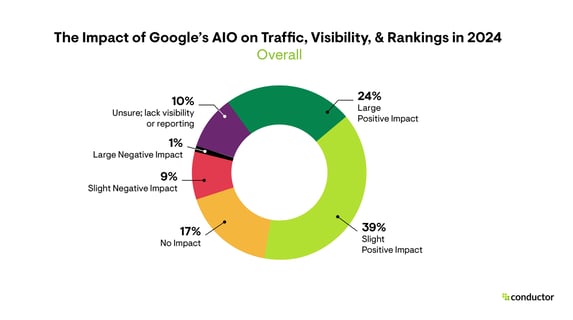

Google continues to dominate the search landscape. Its search engine processes over 8.3 billion searches per day.
If your website isn’t on the first page of search results, and ideally within the top 5 results, you’re missing out on a massive chunk of potential traffic. On average, 69% of clicks go to the first 5 organic search results for any keyword.
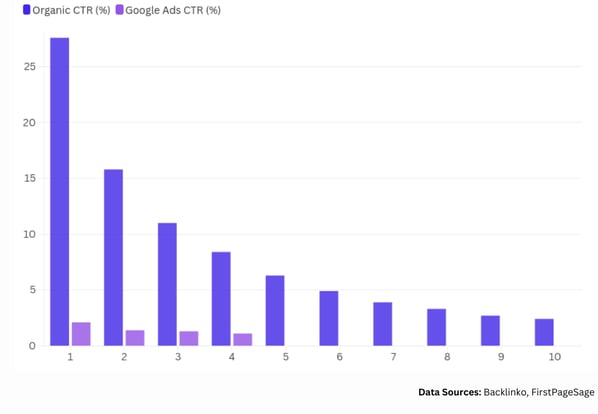

In the same vein, SEO is a high-stakes, high-reward game. For real estate businesses, the potential ROI of search engine optimization is 1,389%. This shows how incredibly effective it is in terms of ROI. But SEO is a long-term investment. You can't expect to see results overnight. For real estate businesses, it can take up to 10 months to start seeing a positive return on your SEO investment. This means you need to be patient, persistent, and committed to your SEO strategy if you want to reap those significant rewards.
When people are searching for local businesses or real estate, 57% of the time, they are making these searches through their mobile devices. Mobile optimization is absolutely crucial if you want your real estate investing business to be found online.
People are 70% more likely to visit a business with a complete Google Business Profile. This makes sense because when I’m trying to research a business and see a complete profile with photos, reviews, and up-to-date information, I am more convinced that the business actually exists. So if you’re in real estate, you need to prioritize your Google Business Profile, making sure it's complete and accurate (if you want to attract local clients).
The Enduring Power of Organic Search for Real Estate Investors
For real estate investors who really nail the game of SEO, it’s an investment that will keep paying off. The core benefit of SEO for real estate investors is that it leads to a sustained, long-term flow of leads, unlike paid ads, which stop generating leads once the budget ends. SEO-optimized content (e.g., blogs, videos) will continue to rank and attract motivated sellers as long as they are kept up-to-date. You don’t need to set a daily ad spend limit.
It's a much smarter, more sustainable way for me to generate leads. It may be slower, but it means you’re not constantly throwing money at ads, and your efforts will keep working for you in the long run. If your website ranks high in organic search results, it also means potential sellers and leads will see you as more credible.
One reason why Google PPC ads will produce much better results for real estate investors than Facebook ads etc., is because it allows you to target location-specific and transactional real estate keywords.
This is something you get with SEO at a much lower cost. It connects you directly with people who are already looking for exactly what you offer. For example, if you rank in the top five positions for keywords like “we buy houses [City]” or “sell my house fast [City]”, you’ll get a good number of inquiries from people who are actively looking to sell their house fast. Because you’re getting high quality leads, you’ll be able to convert more of them into clients.
For example, Charm City Builders and We Buy Houses Baltimore likely get a lot of high quality traffic from Google.
Unlike broad marketing methods like direct mail, you’re not just casting a wide net and hoping for the best. You’re specifically targeting motivated sellers, which means less work for you and higher quality leads.
In this Carrot.com article, real estate investor Tyler Ford's experience really drives home this point. He says that SEO delivers a much higher percentage (80%) of motivated sellers for his business compared to direct mail, which only brings in 10% of motivated leads.
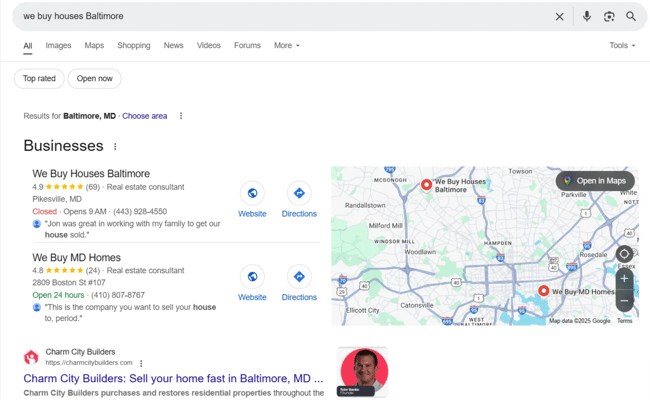



The AI Revolution in Search
The fact is that AI has had both positive and negative impacts on SEO. While it has helped search engines like Google provide more relevant and faster results, websites that used to rank high might now be pushed lower. That’s because the AI Overviews feature takes up a large portion of screen real estate, especially on mobile. This equates to reduced visibility and click-through rates for organic search results whenever these AI Overviews appear.
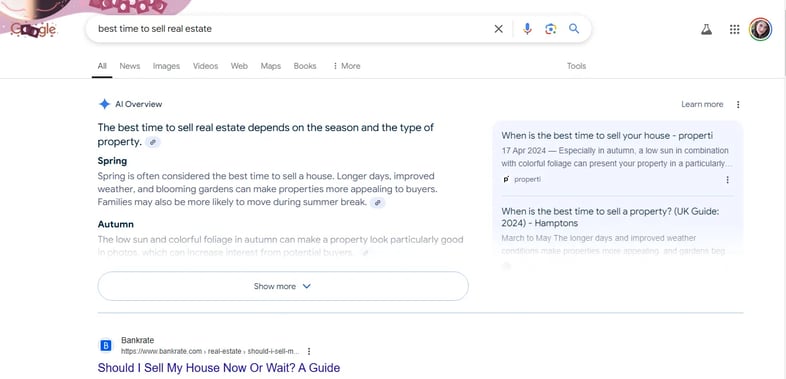

AI Overviews can push the first organic search result down by as much as 640 pixels. That’s a big concern for SEOs. It means even if you’re doing everything right with your SEO, you might still see decreases in clicks and traffic because of AI Overviews, especially for informational queries where generic responses might be sufficient.
While AI could be taking away some of your organic search traffic, it's also getting better at understanding what people are really searching for. This means that if you can create high-quality content that truly answers user intent, you still have a good shot at getting your website in front of the right people. So the focus is shifting from just ranking for keywords to truly understanding and meeting user needs.
Zero-Click Searches
Sparktoro, in a recent study, found that most U.S. searchers (58.5%) find the information they need on Google’s search results pages without clicking through to websites. They either ended their session entirely (37% of the time) or changed their search query to something else (22% of the time).
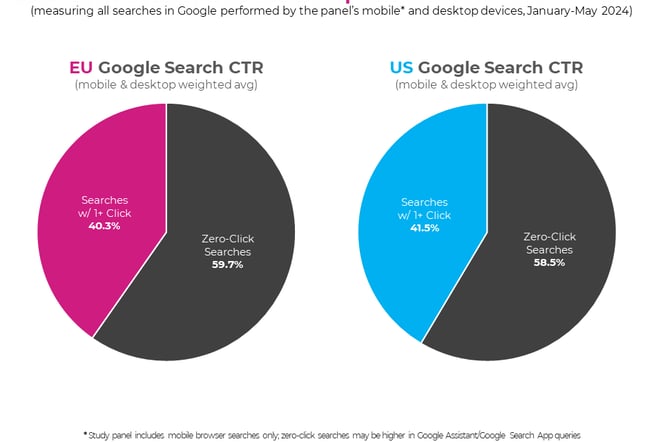

What this means for real estate investors is that a substantial portion of potential leads searching for broad real estate information won’t need to visit your website before they find what they’re looking for. Again this shows why it's crucial to focus on local, hyper-local, or very niche-specific keywords rather than broad, competitive or high search volume keywords.
But amidst all the worry about AI killing search, the impact of AI Overviews isn’t as drastic as most people fear. A recent study by NP Digital showed that zero-click searches on Google have taken up about 2.2% extra share of clicks since the time Google’s AI Overviews feature was launched.
A 2.2% change is not something to overhaul your entire SEO strategy for, especially if it's already working well. Instead, you should adapt by optimizing content for zero-click search and ensuring visibility within Google's ecosystem.
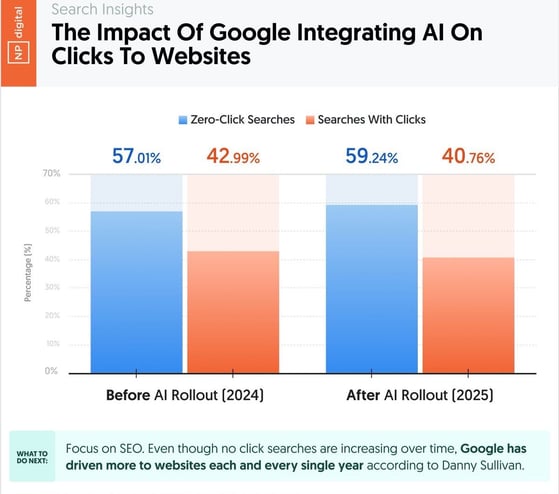

The takeaway is that as a real estate investor trying to get motivated leads from SEO, you can’t just rely on clicks alone anymore. You need to make sure your business captures attention directly on the search results page itself. That’s because a considerable number of your potential clients may get information directly from SERP features like Knowledge Panels, Quick Answers, and Maps, without even visiting any website.
So, you need to make sure your Google Business Profile is fully optimized, and that your business information is accurate and compelling. You also need to use appropriate schema markups for your content pages, and ensure you are directly answering user questions.
The Sparktoro study also revealed that a good chunk (30%) of clicks from Google searches in the U.S. are directed to Google-owned platforms like Youtube, Google Maps, and Google Images. What that means is you need to seriously consider expanding your online presence. Marketing is about showing up where your potential clients are, and these days, that's increasingly on Youtube.
Are Search Engine Ranking Factors now Obsolete?
While traditional SEO elements are still important, you should now focus more on creating high-quality content that aligns with user intent. SEO in 2025 is about truly understanding what your audience is looking for and giving them the best possible content and experience.
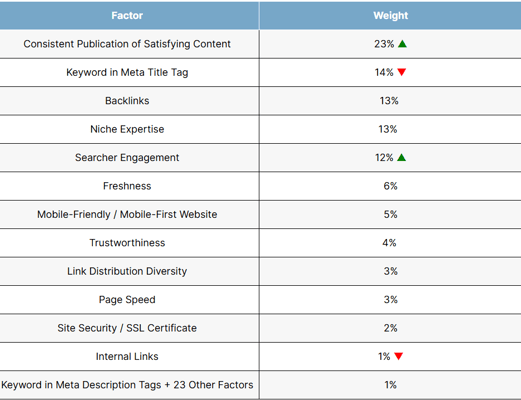

So while technical SEO is still important, it doesn’t carry as much weight as understanding your audience's needs, creating content that answers their questions, and making sure your website is user-friendly.
Additionally, authority remains a strong factor in SEO. Not only does Google want content from niche experts, its ranking system skews towards established brands versus newbies. The factors that bolster website authority are user trust and recognition, naturally acquired backlinks, a social media presence, site security, transparent website policies, and recognition as an entity with a knowledge panel in the SERPs.
Another factor that carries weight right now is searcher behavior. Google uses user interaction data, such as “goodClicks”, “badClicks”, and “lastLongestClicks” (the major elements of NavBoost - a core ranking factor) to assess the quality and relevance of web pages.
Good clicks: If people click on your website page from the SERPs and spend a significant amount of time on it or complete an action, that’s a good click.
Bad clicks: If people click on your site and then quickly leave, returning back to the results page, that’s a "bad click". That's going to hurt your rankings.
Last longest clicks: If your page is the last site a user visits during their search session, and they spend considerable time on your site, that's a strong signal to Google that your content is valuable and relevant.
So you shouldn’t focus too much on attracting clicks as much as on keeping people engaged and satisfied with the content on your website. This means you need to make sure your website is easy to navigate, and that your content is genuinely helpful and matches user intent. Overall, you should provide visitors a better experience than your competitors.
Is SEO Going to Be Replaced by AI in the Future?
No one knows what would happen 10 years from now but right now, AI isn't about to replace SEO. What's more likely is that SEO will change because of AI. You should view AI as a tool that will change how SEO is done, rather than something that will make it irrelevant. That's because people will always search for things - but the way they search might change.
AI can actually help SEO professionals do a better job by giving them deeper insights into what the audience wants, how content is performing, and emerging trends.
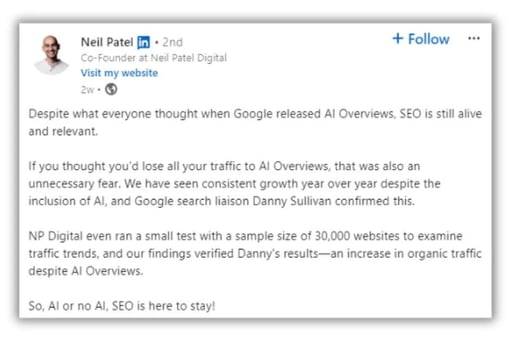

So the SEO industry is not dying, in fact, it’s growing. The SEO service market is expected to grow from $90.35 billion in 2024 to $106.9 billion in 2025. This growth suggests that businesses still value SEO and are willing to invest in it, even with the rise of AI.
However, the scope of SEO jobs might change in the coming years, and a number of SEO professionals may lose their jobs, but generally SEO expertise will still be needed.
Currently, AI is a big part of SEO workflows. It handles things like generating content ideas, creating schema markups, creating code, and analyzing data. But this means that if you’re an SEO, your ability to think critically, understand context, and make strategic decisions will be more important than ever. You need to focus on developing those higher-level skills while also learning how to effectively use AI SEO tools.
AI-Powered SEO Tools
AI SEO tools like SEO.ai, Surfer SEO, Ahrefs, Semrush, and Jasper can be incredibly helpful for things like content optimization, keyword research, meta tags generation, schema markups, competitor research, and site audits.
But AI tools are not a "set it and forget it" solution. You can't just blindly rely on them. You need to be actively involved in the process.
AI can make mistakes like getting facts wrong or producing content that sounds drab and automated. Note that AI-generated content will always have a hard time ranking on Google. So you have to review and edit the output to your taste. You should use these tools as assistants, not have them run on autopilot or as replacements for yourself.
AI Keyword Research Tools
AI keyword research tools like Junia and SEO.ai deliver faster and more precise results than traditional keyword research tools. These tools use artificial intelligence to analyze search data on platforms like Google Keyword Planner, and then suggest the most relevant keywords for your content. The fact that they are free to use is a huge plus.
Also, tools like MarketMuse can identify underexplored keywords based on your existing content. This allows you to build topical authority by creating content around related topics.
AI Content Optimization Tools
Marketers using AI tools save an average of 12.5 hours per week. This highlights the real-world impact of using AI SEO tools: saving time. There are a lot of repetitive SEO tasks that take a lot of time and should be automated. These include monitoring competitor keywords, site crawls, rank tracking, and backlink monitoring.
Streamlining and automating these with AI SEO tools makes your life easier as a marketer. You reclaim a significant chunk of your time, freeing you to do more strategic and creative work. And, with more time on your hands, you can focus on the bigger picture rather than getting bogged down in repetitive tasks.
AI content optimization tools like Semrush Copilot and MarketMuse can make you a much more effective content marketer. These tools analyze web content and provide actionable insights to optimize it based on key ranking factors like keywords, links, and user experience.
Semrush, for example, provides very targeted SEO insights and alerts including: identifying keywords that have dropped in rankings, alerting you to new backlink opportunities, monitoring competitor keyword positions, and identifying areas to improve your content.
Tools like MarketMuse are taking content optimization a step further. These tools help you build a robust content strategy and streamline the content creation process with AI. MarketMuse analyzes your site authority and your existing content, and then provides customized recommendations on keyword opportunities and topic clusters. By using these tools, you can enhance your website's performance, create better content, and improve your search engine rankings.
AI Technical SEO Tools
AI technical SEO tools like Alli AI are moving SEO professionals away from repetitive technical tasks like site speed optimization and schema markup generation, and empowering them to take up the role of strategists. These tools not just help you do technical SEO faster, they allow you to focus on the bigger picture.
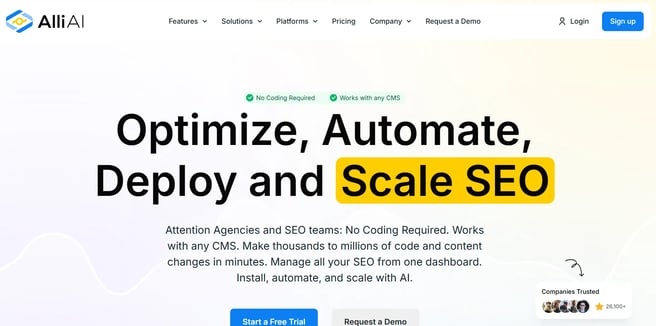

ContentKing by Conductor is also worthy of mention. It monitors your website in real-time and helps you stay ahead of potential technical SEO issues before they become real problems that impact your site’s performance.
AI is breaking down barriers in technical SEO. Previously, tasks like generating schema tags might have required specialized coding knowledge. Now, with AI tools like Jasper.ai and ChatGPT, these tasks can be performed by anybody, regardless of their technical background.
It’s also empowering those who are already versed in technical SEO to perform tasks faster. For example, this blog post on Hubspot explains that connecting OpenAI with Screaming Frog can help you do website crawls more efficiently. With this integration, users can optimize image alt texts in bulk, create anchor texts, generate reports, and automate structured data creation.
AI for Link Building
AI speeds up link building - which used to be slow and tedious. If you’ve ever done link building, you know how many hours you’d spend manually searching for prospects, crafting individual emails, coming up with content ideas, and tracking results. Nowadays, you can allow AI tools to do much of the heavy lifting.
Link building AI tools help with the three core areas where you as an SEO professional would feel the most impact: finding the right opportunities, reaching out to the right people, and personalizing your outreaches.
With tools like LinkHunter and Linkee, you can achieve better results in less time, focusing your efforts on building genuine relationships and creating high-quality content, rather than getting bogged down in the administrative side of link building.
Arguably the most time-consuming aspect of link building is assessing websites. These AI tools don’t just aggregate the right links based on your target keywords, they automatically assess the relevance of each potential backlink opportunity. And relevancy is the most crucial factor in effective link building. Linkee, for example, analyzes how the context of your content matches with potential link prospects to give you the most suitable targets.
Additionally, it automates the entire outreach process, from sending personalized emails to scheduling follow-ups, saving you time and effort.
The Most Important SEO Trends for 2025
In 2025, to stay ahead of competitors with SEO, you have to be aware of and be able to quickly adapt to trends. In this section, we breakdown the most important SEO trends for 2025
1. The increasing importance of structured data
Structured data is no longer a nice-to-have but a must-have for SEO success, with the rise of zero-click searches. Because AI algorithms are largely in charge of ranking content, you need to make sure to speak their language through structured data. Apart from aiding search engines’ understanding, using structured data allows your content to be prominently displayed in search engine features like knowledge panels and featured snippets.
It is also very valuable for entity-based searches (searches for people, places, companies, or things instead of keywords).
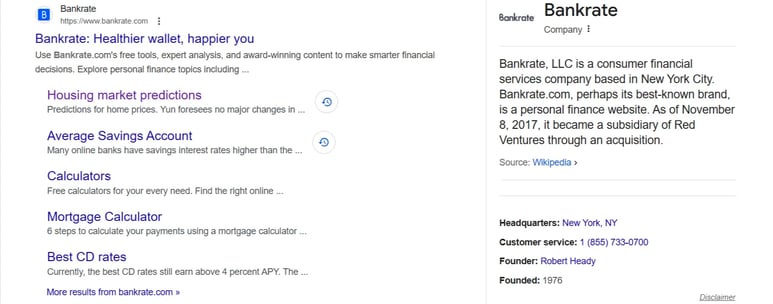

Even if the number of users clicking through to your website decreases, the visibility and brand recognition you’ll gain from appearing in knowledge panels and featured snippets will help you build top-of-mind awareness and trust.
2. The rise of video SEO
Video is rapidly becoming a dominant force in SEO. Creating video content is no longer just a good idea. It’s essential, especially in competitive niches like real estate. You’ll notice that Google now places video content at the top of some search results.
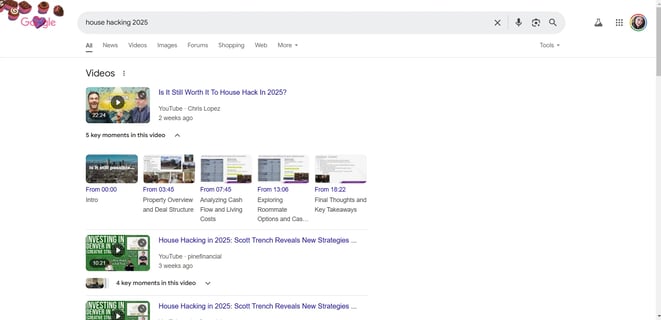

The takeaway is: you need to adapt your approach to include video creation and optimization if you want to maintain or improve search rankings and visibility.
Not necessarily placing videos in content (having videos in content slows down your load speed unless you use lazy loading), but creating and optimizing both long-form and short-form videos on platforms like Youtube and TikTok.
3. Google Business Profile optimization for real estate investors and other location-based businesses
In 2025, if your business relies on local customers, then having a fully optimized Google Business Profile is a fundamental requirement for driving foot traffic and local search visibility, making GBP optimization one of the most important SEO strategies for 2025. You need to ensure that your business information is accurate and consistent across the web, respond to reviews, and use Google Posts to share updates and promotions.
If you don’t operate locally or don’t largely depend on local customers, all you need is a knowledge panel for your business.
If you do operate locally, you should understand that reviews have become a critical ranking signal for local SEO. Google considers review quantity, quality, and recency when ranking local sites. Essentially, your GBP is your digital storefront, and you need to treat it with the same level of care and attention as you would a physical location.
4. Multi-search Engine Optimization
Google's dominance in the search landscape is lessening, and platforms like YouTube, TikTok, Amazon, and even AI-powered search engines are becoming increasingly important for users seeking information and products. Right now though, Google still dominates search. But in the next two years, it won’t just be enough to focus on Google. You’d need to be visible on a number of other platforms, especially AI search engines. The problem that would arise then would be tracking referral traffic from AI searches.
Essentially, you can’t put all your eggs in one basket (Google). You’d have to figure out where your target audience spends time, and then tailor your content and optimization efforts to those platforms also, instead of just focusing on keyword rankings on Google. By diversifying your traffic sources and investing in digital PR and thought leadership content, you can capture a wider audience and build credibility across different platforms.
5. The Rise of Voice and Conversational Searches
The way users interact with search engines is rapidly changing. With technological advancements in natural language processing and the increasing adoption of smart speakers and voice-activated assistants, voice search is becoming dominant.
So you need to write in the same way you and your users speak about a topic. Your SEO strategy needs to be able to accommodate the more conversational and question-based nature of voice queries. This means you need to focus on long-tail keywords, using natural and clear language, and providing direct answers to common user questions.
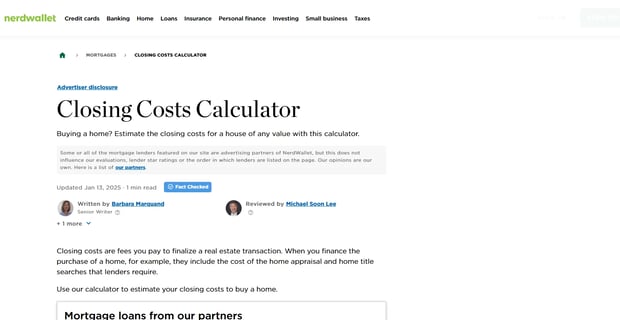

Winning SEO Strategies in the Age of AI
You need some “new breed” strategies to stay competitive in this AI SEO environment. Some of the old rules still apply (like building earned links), but to create content that ranks high on Google in 2025, focus on the following:
Experience, Expertise, Authoritativeness, and Trustworthiness (E-E-A-T)
In 2025, your content must demonstrate real-world experience, expertise, authority, and trustworthiness. This means you need to showcase your (or your authors') credentials or have writers agree to a ghostwriting engagement (alternatively you can have an expert read through and verify the information and add them as an author alongside the main writer).
You should also build your site’s online reputation, and ensure your content is accurate, reliable, and up-to-date.
Even though E-E-A-T is not a direct, quantifiable ranking factor (you can’t optimize for E-E-A-T in the same way you optimize for keywords), it fundamentally shapes how Google views your content’s quality, which does impact your visibility.
It is especially important for YMYL (Your Money or Your Life) industries like healthcare, finance, real estate, eCommerce, and technology, where content has to be trustworthy and credible, or else it might lead to financial or health losses.
User Experience (UX) and Core Web Vitals
User experience, as measured by Core Web Vitals, is now a major driver of SEO success. Metrics like loading performance (loading speed), interactivity, and visual stability now determine where your site ranks on Google. And you can measure them all in Google Console’s Core Web Vitals report or through Google’s PageSpeed Insights. Largest Contentful Paint (LCP) measures loading speed. You want to keep this at 2.5 seconds or less.
Interaction to Next Paint (INP) measures the interactivity of your website (how fast does a button respond when you click it? etc.). You should keep this at 200 milliseconds or less. Cumulative Layout Shift (CLS) measures the visual stability of your website. Keep this at 0.1 or less.
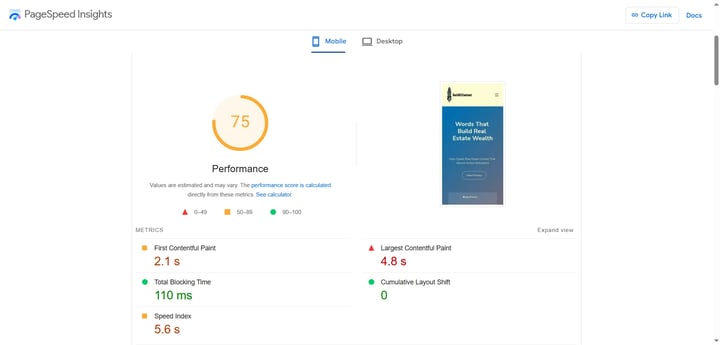

While these metrics might not directly impact your SEO rankings, they improve your site’s user experience, which leads to lower bounce rates and consequently higher rankings.
Content Quality and Relevance
In a world where AI can churn out vast amounts of content in minutes, the value of truly human, high-quality content is increasing. Google (and humans) are getting tired of the mass of AI content. They want content that provides real value, answers specific questions, offers unique insights, and meets search intent.
On the flip side, for us content creators, AI has raised the bar. We can’t just create generic, easily replicated content and expect it to move the needle. Because we aren’t just competing with other human creators. So regularly updating your existing content to maintain its relevance is crucial now more than ever.
Content now has to be not just informative and relevant, but also distinctive. That is, we have to cover topics in-depth, and create diverse forms of content that AI can’t easily replicate - things like original research, case studies, trends analyses and expert opinions. These types of topics also help enhance a brand’s authority and industry credibility.
Learning from Real-World Examples
Now that we’ve sufficiently answered the question, “Is SEO dead in 2025,” let's explore some real-world examples of real estate investing companies that are winning the SEO game, and see some common mistakes real estate companies make when it comes to SEO.
The Winners in 2025
1. BiggerPockets
Why they're winning: Success in SEO is tied to having a well-planned, diversified content strategy that meets users where they are, and addresses their specific needs through careful keyword targeting, across several content mediums. This highlights why BiggerPockets is winning the SEO game. They’ve established themselves as the go-to resource for investors of all levels with comprehensive content across a range of formats - articles, blog posts, forum posts, Youtube videos, podcasts, and calculators.
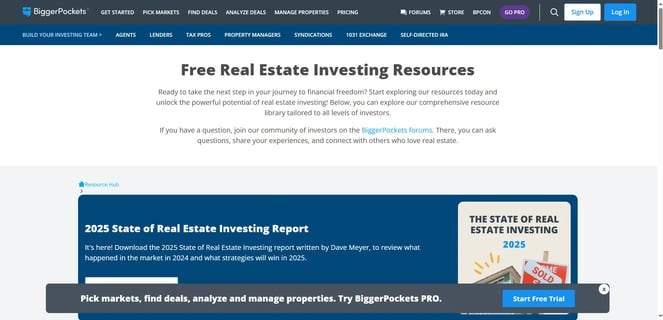

SEO Strengths:
Targeted keyword optimization: A laser-focused keyword strategy is still the engine that drives SEO success. BiggerPockets has built a robust content system, but I think their ability to understand and target exactly what their audience is searching for, across all experience levels, is the foundation of their dominance. They quickly jump on real estate trends and you’ll find answers to almost all beginner real estate investing questions on BiggerPockets.
Strong community: Real estate investors engage on the BiggerPockets forums and create a lot of user-generated content. Google loves user-generated content because it tends to meet the “experience” criteria, so it features relevant BiggerPockets’ forum posts prominently whenever people make real estate investing queries.
E-E-A-T: The blog and forum posts are created by actual investors in the field. This fulfills both the experience and expertise criteria for E-E-A-T.
Multimedia content: BiggerPockets’ podcast and YouTube channel are two of the biggest in the real estate investing niche. Consistent creation of quality content through podcasts and videos expands their reach and brand presence. This helps them rank higher for real estate investing keywords. The founder, Joshua Dorkin, and former podcast host, David Greene, have also created a number of books, which are some of Amazon’s top selling on real estate investing. This further boosts their brand presence.
Reputable backlinks: They have a large amount of high quality backlinks. They have accumulated these over the years through their podcast, free courses, interesting forum posts, free and paid calculators, and affiliate marketing.
Likely to continue winning because: Long-term SEO success isn't just about current performance; it's about building a moat. BiggerPockets has done this. By creating such a vast and valuable resource, combined with a thriving community, they've essentially secured their position. They've built something so comprehensive and engaging that it's incredibly hard for anyone else to replicate. Apart from that, their content is constantly updated, and they’re expanding into new mediums.
2. RealWealth
Why they're winning: RealWealth (one of my clients) demonstrates that a focused strategy, targeting a well-defined niche and the right keywords within that niche, can be incredibly effective. RealWealth is a mid-sized brand within the real estate investing education and resource niche. While not as massive as BiggerPockets in overall scale and traffic, they are winning the game of SEO. That’s because they rank well for terms that are highly relevant to their target audience (those interested in passive income, rentals, and market analysis).
SEO Strengths:
Owner’s personal brand: Building a strong personal brand, and associating that brand with your company, can be a major SEO differentiator. It's a form of "borrowed credibility" that can be incredibly effective. Kathy Fettke's established reputation as a real estate investing expert directly translates into trust and authority for the entire brand. She is well-known in the real estate investing space with a number of books and media appearances that add to RealWealth’s overall brand equity.
Content marketing: RealWealth produces a significant amount of in-depth content (blog posts, podcasts, videos, webinars) that targets a wide range of real estate investing keywords.
Domain age: The domain is older. This is a positive SEO ranking factor.
Content diversification: RealWealth produces a wide range of content types (podcasts, blog posts, videos, and webinars). This diversification helps them maintain a strong brand presence, which boosts rankings.
Likely to continue winning because: Long-term SEO is about aligning with the search engine's mission: to provide the best, most relevant results to users. "Chasing algorithms" is less effective than consistently creating content that truly helps people. I see this as the core principle that will determine RealWealth's continued success – prioritize the user, and the rankings will follow.


3. SparkRental
Why they're winning: “Going niche” can be a powerful SEO strategy. Although smaller than both BiggerPockets and RealWealth, SparkRental dominates in the rental property management space because it’s not competing with the entire internet, just a smaller, more focused segment. By concentrating their efforts on rental property management, SparkRental has been able to achieve higher rankings and greater authority within that specific domain
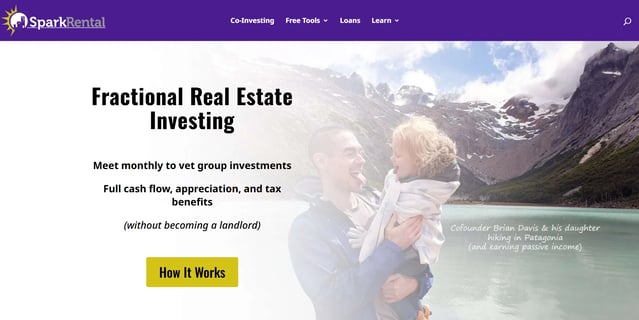

SEO Strengths:
Free, valuable tools: Offering free tools like a rental cash flow calculator, free rental screening for landlords, interactive maps, and a lease agreement creator, attracts users, encourages engagement, generates backlinks, and positions SparkRental as a helpful resource for landlords.
Content that directly addresses user needs: SparkRental consistently delivers practical advice and step-by-step guides that directly answer the questions and solve the problems of their target audience (landlords and rental property owners). Providing solutions through content and tools isn’t just fundamental to SEO, it’s a great way to create a lasting, returning audience.
Niche authority building: SparkRental has established itself as an authority in the rental property management space. Niche authority is highly valued by search engines.
Cumulative SEO effect: SparkRental has been publishing practical, high-value content for landlords for almost a decade now. They have built solid domain authority over time, which makes it easier to rank new content high for target keywords.
Likely to continue winning because: SparkRental is a prime example of how strategic specialization and a user-first approach can be more powerful than sheer brand size. The fact that they are providing immediate value to users through their free tools and practical content will help them maintain and solidify their authority in the rental property management space.
Common Real Estate Investor SEO Mistakes
1. Ignoring user intent and search experience
Mistake: Focusing on keywords while ignoring user intent. SEO is now, more than ever, about understanding and fulfilling user intent. That’s because AI search algorithms can now quickly decipher what users are actually looking for when they enter search queries. Google now prioritizes user satisfaction over keyword density.
Real estate specific example: A real estate property management company’s blog post titled “Best Investment Properties Phoenix Arizona” mentions the keyword about 10 times in 1,000 words of content talking about the pros and cons of investing in Phoenix and why you need a good property management company. It then provides a list of Arizona investment properties that people should consider investing in.
But it lacks detailed information about some things users might be searching for. It doesn’t answer questions like: “What neighborhoods in Phoenix are up-and-coming?”, or “What are the current rental yields?”
Better approach: Users have deeper needs and questions than just the surface-level keyword phrase. Instead of playing a game of keyword matching, a comprehensive guide titled “Best Places to Invest in Phoenix Arizona” would rank for the keyword “best investment properties phoenix arizona”.
This guide should include analyses of different neighborhoods, detailing cash flow and appreciation potential for each neighborhood, and then it could highlight a number of properties in each neighborhood. It might also highlight specifics people investing in Phoenix might need to know. Things like what’s the state of the overall market? And what are the best financing options for investors in Phoenix?
2. Neglecting Mobile-First Optimization and Core Web Vitals
Mistake: Failing to optimize your website for mobile and neglecting things like page load speed, interactivity and visual stability (Core Web Vitals). Google uses mobile-first indexing. This means that if a site doesn’t load fast on mobile or the mobile version looks poorly designed, it's going to rank lower than competitors and a number of its pages might not even be indexed, regardless of how good the desktop version might be.
Real estate specific example: A real estate brokerage company’s website has beautiful, high-resolution images of properties, but these images are not optimized for mobile. They take a long time to load on phone. The website also lacks responsive design, leading to a poor user experience on smaller screens. The layout shifts as the page loads, causing users to click on the wrong button. This drives mobile users away, leading to a high bounce rate.
Better Approach: Technical SEO, specifically mobile optimization and Core Web Vitals, directly impacts user behavior, and user behavior directly impacts rankings. The solution is to implement responsive design to adapt your website seamlessly to different screen sizes. You also have to optimize images using formats like JPG and WEBP as well as employ image compression to ensure fast loading on mobile. You can see the effects of your optimization efforts via Google PageSpeed Insights in Search Console.
3. Content plateau and thin content
Mistake: Starting strong with content but not consistently updating or expanding your content library. SEO requires ongoing content creation to maintain and improve rankings. Stale content can lead to traffic stagnation.
Real Estate Specific Example: A real estate investment firm in Austin, Texas, focusing primarily on commercial real estate had previously created in-depth content and ranked for a number of keywords in the past year. With so much to do and in an attempt to keep their blog alive, they have just started creating thin content that highlights some PR wins or company milestones.
While this isn’t bad, these types of content don’t offer real value to clients. They might be great additions to the PR section of your website. But if you don’t consistently create content that has depth, originality, and real value, you will struggle to rank long-term.
Better Approach: Keep the momentum going. Use analytics to pinpoint content that is no longer driving traffic or has declined in rankings. Understand what makes your best content successful (topic, format, depth, keywords). Replicate those elements in content updates and in new content.
Also create comprehensive, authoritative "pillar" pages that cover broad topics in depth. Then develop a network of related articles (cluster content) that link back to the pillar page, covering subtopics in more detail. This topical authority approach can significantly boost SEO.
Conclusion
So is SEO dead in 2025? Definitely not! SEO is not dying; it's evolving, and AI is a key driver of this evolution.
As someone who’s been in the SEO space for years now, I can attest that the core principles of SEO remain relevant, but the tools and strategies are changing. For real estate investors creating content, you have to embrace these changes and adapt your strategies accordingly if you want to improve your online visibility, attract better leads, and ultimately grow your business with SEO in 2025. Want a free SEO audit for your real estate site?
Agnes Gaddis has been an SEO expert and SEO content creator for over 9 years, across real estate, finance and marketing with publications on websites like Inman, Bankrate, GetResponse, Mention, SparkRental, Rentals.com, Credit.com, among others. Right now, she writes confident content for real estate investing companies and platforms. You can connect with her on X (@alanagaddis)


